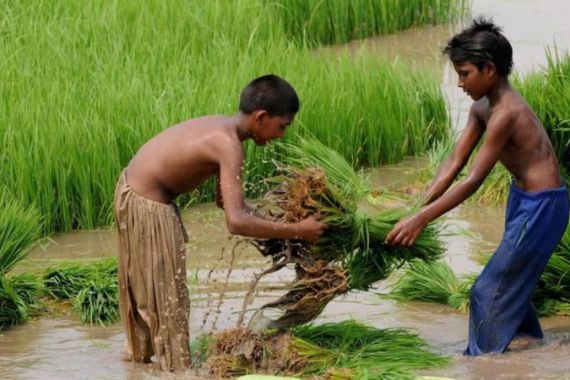Pakistan farmers grapple with climate change
Government attempts a new insurance scheme to protect farmers from floods and other worsening weather problems.

Gujar Khan, Pakistan – After five consecutive dry winters, Abdul Qadeer was jubilant at the prospect of a plentiful harvest of wheat after December rains soaked his farmland.
But the 39-year-old farmer’s hopes were destroyed last month by torrential spring rains and a hailstorm that flattened his wheat crop.
Keep reading
list of 4 itemsAfter the Hurricane
World’s coral reefs face global bleaching crisis
Why is Germany maintaining economic ties with China?
Qadeer is one of many farmers suffering the effects of unpredictable weather patterns and variable rainfall, which scientists believe are linked to climate change.
Now Pakistan’s government is trying to introduce crop insurance to save farmers from economic ruin. Qadeer, who farms land in Gujar Khan, approximately 55 km southeast of Islamabad, Pakistan’s capital, vividly recalls the unexpected volley of pebble-sized hailstones that lashed his 15-acre (6-hectare) field for about 15 minutes one day in the last week of March.
“I could clearly hear dull, clunking sounds of the hailstones that slashed through the stalks of the standing wheat crop and knocked (the ears of wheat) to the ground,” Qadeer said.
He had anticipated harvesting a good crop in the second week of April, but the unseasonal storm destroyed his wheat, causing losses of 800,000 Pakistani rupees ($8,000).
Zaman Ali, a farmer in Islamabad’s southern suburb of Chak Shahzad, says 70 percent of the wheat he was growing on 9 acres (3.6 hectares) was destroyed by strong winds and heavy rain.
Farmers are really defenceless when such unwanted torrential rains and hailstorms strike their crops. We are really completely at the mercy of the weather
Ali believes the yield from the remaining wheat will reach only 60 percent of what it should have been, because the rains brought unseasonably low temperatures, preventing the grain from maturing properly. Ali described the weather as unprecedented in his 15 years of experience growing crops.
“Farmers are really defenceless when such unwanted torrential rains and hailstorms strike their crops,” said Muhammad Riaz, who lost crops worth about 1.6 million rupees ($16,000) on his 24-acre (10-hectare) farm in Haripur, 65 km (40 miles) north of Islamabad. “We are really completely at the mercy of the weather.”
Insurance coming soon?
“The solution to such grim situations that are becoming frequent lies in crop insurance,” said Nazar Muhammad Gondal, Pakistan’s former federal minister for food and agriculture. “Farmers can at least recover some of the financial damages, and are able to cultivate next season crops.”
Crop insurance is not currently available in Pakistan, but Iftikhar Ahmed, chairman of the state-owned Pakistan Agriculture Research Council (PARC), said the government is leading negotiations with insurance firms and banks to introduce a national crop insurance programme, similar to those introduced in Sri Lanka, India and Nepal. It is hoped the insurance will be available by mid-November this year.
In Pakistan, wheat is sown in mid-October and harvested in mid-April. Around 16 million acres (6.5 million hectares) are planted with wheat every year, yielding around 25 million tonnes of grain.
“Eight to 10 years ago, the spring season used to come in the first week of March and last for 25 to 30 days. Now, it comes in late March and lasts for only 15 to 20 days,” said farmer Qadeer.
Spring rain is a rare phenomenon in Pakistan, particularly in northern and central areas. The inclement weather lowered the temperature by 20 degrees Celsius to around 9 degrees this year.
“From March to mid-April, the wheat crop needs (temperatures) above 30 degrees Celsius for its healthy growth of stalk and grain, and to avoid pest attacks,” said Qamar-uz-Zaman Chaudhry, the World Meteorological Organisation’s vice president for the Asia region and a former director-general of the Pakistan Meteorological Department (PMD).
According to PARC’s Ahmed, high moisture levels in the air have also led to fungus and insect infestations.
Production drops
Officials at the federal food security and research ministry in Islamabad say they expect wheat production from rain-fed land to be 30 percent lower than normal as a result of the extreme weather.
|
|
| Pakistan floods wreck havoc on farmers |
Ghulam Rasul, chief meteorologist at the PMD, said that although hailstorms can be forecast six to 12 hours in advance, the damage they cause to crops cannot be staved off.
“We had predicted both torrential rains and hailstorms on March 23 and 24 in the upper and central parts of the country, and dust storms and intermittent rains for two to four days in the last week of March in southern and coastal areas,” he said.
“Since these untimely or unseasonal rains and hailstorm came at a time when most of the winter crops such as wheat, mustard, vegetables were near harvest, nothing could be done to save the standing crops,” he explained.
Ibrahim Mughal, chairman of Agri Forum Pakistan, a nongovernmental farmers’ body based in Lahore, said the government has consulted with representatives of farmers’ groups about ways to make a national insurance programme effective.
The views of smallholders are key because their share of cultivation is around 75 percent.
“We have suggested that, without a mass awareness campaign about the benefits of crop insurance and subsidising premiums for small or subsistence farmers…the insurance programme is unlikely to win the hearts of farmers,” said Mughal.
This article first appeared on the Thomson Reuters Foundation news service